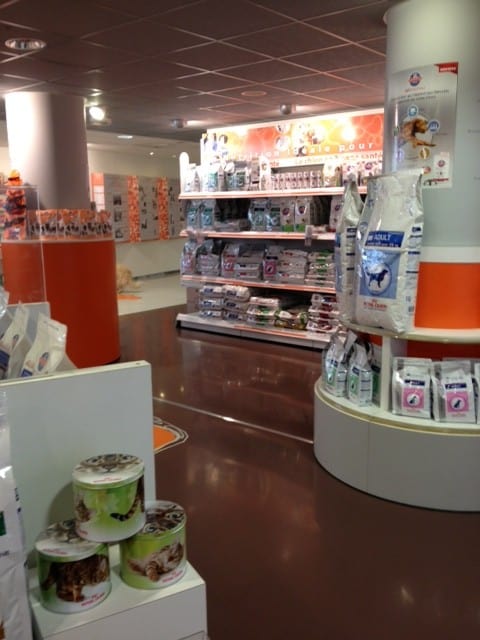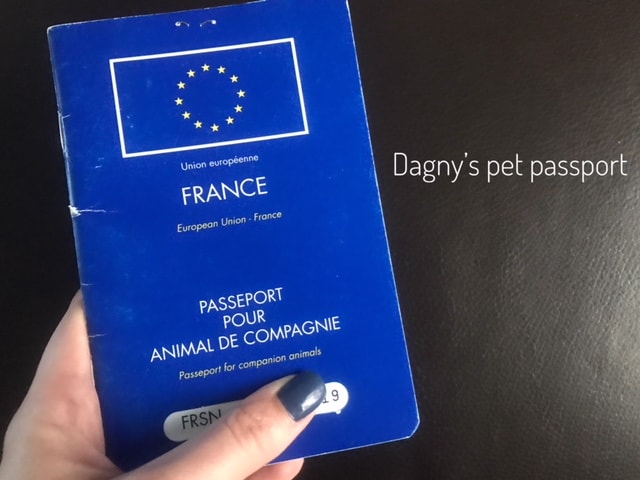Our furry family members deserve quality medical care and I’m happy to report that my experience with French veterinarians has been top notch. Vet care in France is one of my favorite things about living here and probably makes my top three list of things I love about France. That’s not to say that excellent wine and cheese aren’t major perks, but when it comes to serious stuff, knowing that my dog is taken care of puts me at ease.
If you’re considering a move to France or are just curious about what it’s like having a pet in France, read on for information on going to the vet!
Vet care in France
It’s been quite a while — several years — since I’ve written any pet content on Oui In France and I have no idea how that happened. Actually, yes I do. It’s called neglecting your editorial calendar. A lot goes into blogging and I need to be better at planning content ahead of time!
So to get back to my roots, I’m doing a little series on what it’s like having a pet in France. This first part is all about going to the vet. I’ve written about the specific differences on having a pet in the USA vs. France in this post but I’m starting fresh today.
Update: Dagny sadly passed away March 5, 2022.
So first, some background. I have one dog and had planned for her for years before moving to France. I got her on my birthday about a week after moving to France. Dagny is a Cavalier King Charles Spaniel and is a huge part of my life. I really don’t know where I’d be without her. Aside from my husband, Dagny is the most important “furson” (like furry person, get it?) in my day-to-day life.
We talk, we cook, we clean, we work, we walk… she’s my right-hand woman and I wouldn’t have it any other way. That’s why her care is super important to me. We want the best for our loved ones — furry or not!
First, I feel that veterinarians in both the USA and France are well educated and generally provide great care. Some vets have better bedside manner and personalities, but that’s the case with doctors anywhere. You have to find someone you like and trust.
France is well connected in terms of veterinarians and most towns have several vet clinics from which to choose. Their offices are modern and provide a wide array of services. Our particular clinic is a practice of 2 doctors who are both excellent.
They always make time to fit us in, never make me feel rushed, and I know they care about Dagny.
As a foreigner, vets in France have never made me feel stupid when I’ve asked what have surely been some stupid questions. They’ve been patient and more than accommodating and tend to go the extra mile without nickel and diming me.
Again, this is just my experience, but my vet will empty Dagny’s anal glands and trim her nails at no extra charge. Our vet also liaised with a colleague to research homeopathic treatments (at no charge) a couple of years back and is really good with email. They never make me feel like a burden.
I also bring the office a Christmas gift every year, which Tom says is an unusual thing to do in France, so maybe they go the extra mile for me because I show my appreciation in the form of large gift baskets of specialty chocolate. 🙂 But honestly I don’t think that’s the reason.
Why we made the switch to a raw food diet with Dagny >>
Making an appointment at the vet in France
To make an appointment, you simply call your vet. If it’s something more urgent, they’ll do their best to fit you in the same day. At our practice, the vet techs also do administrative work so when I call, I’m talking to someone I actually know and not an answering service.
They are familiar with my dog and will usually remind me to bring my dog’s passport, which is a little booklet of his or her records that gets updated.
Here is Dagny’s slightly weathered passport:
At the vet’s office
When we arrive, I give Dagny’s passport to the front desk and then take a seat in the waiting area. The vet herself comes out to greet us when it’s our turn and takes us into the exam room. All vaccines and treatments are done right in front of us so there’s no stress about what might be happening “in the back.”
She’ll look in her ears, take her temperature, administer vaccines and do anything else that needs to be done right there with us. The tech is only called in if needed and we usually help by holding Dagny still or assisting the vet in whatever she needs.
I find that our appointments are 100% about us and that French vets give us their undivided attention. I’ve had pets in the US growing up and have taken friends’ pets to the vet as well and I’ve found US vets to be a little more rushed. Or you see the tech first to go over why you’re there and then the actual vet comes in for a few minutes and jets out as soon as he/she is done.
That’s not to say that no US veterinarians are relaxed and spend more time with the patients, but in general I’ve found the care to be a little more personalized and hands-on in France across the board.
If something warrants a call to the vet, I always speak with the tech and she’ll call me back after speaking with the doctor (or the doctor will herself depending on what it is) usually within an hour or two. Great service!
At our practice, when the appointment is over the vet herself handles the bill, but in larger practices, you head back out to the front desk to pay your bill. Speaking of costs…
French vet costs
I’m incredibly pleased with vet care costs and it’s one of my favorite things about having a pet in France. Vet bills are much, much more affordable here. A regular consult at our vet in the Maine-et-Loire is about 30€. Medicines are reasonably priced and even specialists’ visits tend to be under 100 euros for a consult.
An after-hours ER visit is about the same price as a specialist’s consult (about double the cost of a regular vet consult but this can vary). Then any tests and services have the after-hours rate as well. (but a small price to pay to ensure your animal’s safety, in my opinion).
The biggest surprise was a trip to a veterinary dentist when Dagny was about a year old and had slightly chipped her canine tooth. It didn’t expose the root thankfully, but without treatment, it would decay. Between the x-ray, anesthesia and small filling, it was 400€. I don’t even want to think what that would have cost in the USA.
Medicine
Most vets have a selection of treatments, sprays, pills and creams right in their office so you can buy everything you need right there at the vet. From antibiotics to flea/tick treatment to joint supplements, it’s all available just a shelf or drawer away.
If your dog has any issues that require daily medication, your vet will give you a paper prescription that you can then fill at any pharmacy.
Back in the US, my childhood dog’s daily prescription medication would be filled — quite expensively I might add — right there at the vet’s office but in France, medication is compounded and dispensed at a regular pharmacy. Yes, the same pharmacy you’d go to for human medication.
Specialty care & emergencies
You tend to find vet specialists in and around larger cities although some vet practices have specialists on staff. Over the years, Dagny has seen a fair share of specialists/ER vets for various issues including the orthopedist and ophthalmologist.
It feels strange writing this — almost like it’s too good to be true — but every vet we’ve seen has been excellent and exceeded my expectations. They’ve been efficient, thorough, kind (one’s bedside manner was a bit lacking, but hey, you can’t win ’em all) and I’m so pleased with the treatment we’ve received.
An example of that kindness was when we saw a specialist’s willingness to meet Dagny’s comfort level by adapting his routine to her needs. Dagny was scared of the metal exam table and was hiding under a chair, so instead of being impatient and forcing her up on the table, the vet had no problem getting down on his hands and knees on the floor and doing the exam little by little down where Dagny was under the chair.
He was happy to take breaks and give her some space, all the while explaining everything he was doing without a hit of annoyance in his tone.
I’m sure any veterinarians or techs reading this would consider the above example normal behavior — doing what it takes to put the animal and the owner at ease. But when you’re a foreigner, not sure of how things work, stressed about your pet, and having to explain something quite complicated in your second language, anything to put the patient and her mom at ease is so appreciated.
Emergency services
If your pet has an emergency or any type of issue after hours, most areas have emergency vet services. In my town, there’s always a vet on call and the contact information is on my particular vet’s answering machine.
We can call at any time and can get the vétérinaire de garde‘s name and phone number for that night. The on-call vet service is on a rotation, so sometimes the emergency vet on call is our own vet. That way, no one vet is always stuck with the night shift.
Also, as you get closer to Nantes, there are some vet clinics that have 24/7 services so you can always go there no matter the time of day/night and get help. No need to find out who is on call since that particular clinic is always open.
Several times, we’ve had a slight issue after hours or on a Sunday and have called the on-call vet for advice. They’ve been happy to help over the phone for free if it’s not dire. I’ve never felt like I was bothering the vet.
Again, after-hours fees for an emergency appointment are about double the cost of regular appointments but are wholly worth it in my opinion. My motto is “better safe than sorry” when it comes to my pet. “Wait and see” to save a few bucks can end badly so I’d rather call than chance it. France makes it easy for me to keep Dagny healthy and happy.
If you’re considering having a pet in France, don’t let any stress or anxiety about French vet care stop you.
***
How has your experience been with having a pet in France and going to the vet?
Here’s Part 2 of my having a pet in France series!
PIN ME:













We are moving to France next year. Our biggest point of anxiety is pet care. Although we have already found a vet, it was great to read your post and hear about your experiences. Thanks!
Glad you enjoyed the post, Ashley! Find a vet you trust is the most important thing so if you’ve already found one, the rest is smooth sailing. That’s not to say you’ll never run into an issue, but overall, I’ve been so relieved about the quality of vet care here. Sometimes it’s hard to know what to expect until you’re in the situation. Feel free to write if you have any additional questions!
Your vet sounds similar to ours up here in the north of France more or less. It’s a clinic with a hospital (the only one like that I could find here after trying a few, the rest seem to be a small office with 1-2 vets but not an extensive hospital area). Ours also has a small animal vet (NAC) which is great because I also have birds and chinchillas. The small animal vet has been WONDERFUL for my chinchillas very knowledgeable and caring. I think the standard of care is great overall but I feel like I have to push a little more for certain treatments which has been kind of frustrating for me. My dalmatian has really severe skin allergies but the vet only seems to want to give us a shampoo and change his food (things we have already tried multiple times). Reading your post though I am wondering if it’s because of where we live, kind of a rural and maybe not exactly the richest part of the country. He has mentioned how expensive tests are and that they may not be accurate, so maybe he just feels like we wouldn’t want to spend the money anyway (but we would, my dogs are my babies too lol). This last time my dog had a bad skin outbreak I actually made a list of medications that other dalmatian owners have been prescribed and the vet was very open to trying them. So perhaps I just needed to push harder and advocate for my dog more to get what I want here. I feel like in the US that stuff would be almost forced on you so I’m not used to what I perceive as a lack of action here- I guess. Another thing I really appreciate is that the vets don’t pressure you into immediately spaying and neutering your puppy. I asked at my dogs first check up about neutering him in the future and the vet actually cited many articles and studies done recently and had a lot of information about why it’s good to wait. He also knew that I wanted a running partner in my dog when the time was right so he made sure to educate us about why we should wait. We still haven’t had our dog neutered yet but it comes up every visit and he always says that there is really no need to do it yet as he is happy and healthy (and not at risk of an accidental litter lol). I’ve written a book here but I just wanted to say that I agree with you. I’m satisfied for the most part of the quality of vets here I think my major complaint is probably a lack of ability on my part to properly express myself in French which is my problem not the vets!
Hi Jessica! Thanks for sharing you experience. I always forget that you have chinchillas. It’s really a menagerie chez toi! I love it!
I think what your saying about it being rural contributes to the fact that the vet isn’t pushing treatments on you. Maybe it’s a French cultural thing too since human medical care is reimbursed and what we think of as affordable vet care is still a big expense for a French person (who is used to medical stuff being dirty cheap). So in a way I can respect your vet for not guilting you into shelling out a ton of money to try every treatment under the sun. But I completely understand wanting to get your dog help and just finding a solution already. So there’s a balance between being a vet who is too pushy and salesy and barely recommending anything other than the bare minimum to keep costs down.
Glad to hear your vet care has been mostly good!
I love this! Your posts on pets are some of my favorite. I love the term “furson”- I might have to steal that. Also noticed there’s a tube of Optimmune in your picture- is Dagny on it? Molly has to be on it for life and it’s not a cheap one haha.
I took Molly to the vet in France when we first got here for a rash, and coughing. I love how they will dispense flea & tick medications by the month rather than demanding you purchase them in 3 or 6 month supplies. I also felt the prices were Really good! Her whole first visit, including the exam, a spray to take home, an injection, antibiotics to take home, and pain meds to take home was only 120 euros. Now obviously if you’re still using USA$ it gets kinda tricky, but in Euros that’s chump change at the vet!! So awesome.
Hi there, Jessica, thank you! Cavaliers can have very sensitive eyes and while Dagny doesn’t have dry eye syndrome, she does have dry eyes from time to time and the vet recommend Optimmune. So I put it in her eyes when she has a little more mucous than usual. Just a dab in each eye once a day (probably twice a week) although she can go months without needing it at all. At 55 euros/tube, I’m thankful for that!
So happy to hear your experience at the French vet was a good one. Hope Molly is feeling better!!
We have had mixed experiences. The vet in our village is, let’s face it, a large animal vet. He may be great with cows and horses, but I know at least 2 other people (and me) who are convinced that he killed their pets through ignorance – either giving too much anaethestic, or not understanding the physiology of a bulldog, or, in my case, telling me my newly adopted elderly cat was just “sulking” when in fact she had a virus, and was dehydrated.
HOWEVER, the vet in the next village along is a dream! He always seems to be able to fit us in on the day we ring, knows our cats, and was so kind and sympathetic when he had to put Pumpkin down. He gives advice, and he also gives reduced-cost treatment to the “Poor Cats” (the feral cats) that Marie-Odile & I look after and feed.
We would like to insure the cats but have never found reasonable insurance, unlike in the UK. I started with a company, and ended up paying a phenomenal amount per month, and only able to cancel it within a month of the renewal date. Even claiming the cat was dead required a large amount pf paperwork!
For us, vets have been both the good and the bad.
Thanks for sharing your experience, Alison! I have to say that vets in rural towns in the US aren’t always great either, but glad the vet in the next village has been great. It’s so important to find someone you trust!
Glad your little furson gets well looked after in France and good to hear about the use of homeopathy too. #AnimalTales
We have just had our first visit to a vet in France. We are currently fostering a cat for our local SPA and she developed an extremely sore paw. We were able to make an appointment straight away and we were very impressed with the service we received. The vet was truly lovely and very helpful. The SPA has an arrangement with this vet so that all the costs are covered by the refuge. I’m happy to say the cat is well on the mend! Thank you for your interesting and informative post!
The cost of your vet care in France is similar to ours in the UK. Our friends take their dog on holiday with them to France every year, I’d like to do that with Ralf so we need to organise a passport for him.
Vetinary care sounds really good, and it’s interesting to hear the differences between the US and also compare to here in London! We’ve been with our vet for 12 years and they are lovely, I’m very lucky for that!
Thanks for sharing!
#animaltales
i only have experience of vet care in south africa and in dubai of which i cannot fault either and both were very different in terms of how bookings were made and treatment received animal tales
Having lived in France for 10 years and had pets and farm animal for all that time we do spend quite a bit of time at our local vet’s practice and I have nothing bad to day about them. When poor Poppy was near the end of her life the vet was even willing to give us her personal phone number so we could contact her on New Year’s Day if we needed to. I am also much relived that the bills are considerably lower than in England.
It is lovely to see you blogging about animals again and thank you so much for linking up with #AnimalTales. Give Dagny a hug from me!
Just gave her a hug for you! So happy to be blogging about pets as well.
Sounds like your vet is just like ours — caring and willing to go the extra mile. We have our vet’s personal cell too. Never had to use it but knowing it’s there puts me at ease.
This is a very helpful article!
I’ve had two different dogs in France and visited the vet there plenty of times. It has always been a good experience and, as you say, not expensive (much less than back home in the States.)
I spend part of the year in France and part in the US and have become knowledgeable on transporting a dog back and forth. For anyone interested in knowing some of the ins and outs, here’s an article I’ve written on the subject: http://tinyurl.com/y9llz5r2
Thanks for the link, Keith! Glad vets have been good to you and your pups (not to mention the wallet) too!
I have been in France (from San Diego) since 2009 with various dogs, in the Herault and now in Provence. I have had very good experiences in both places, and agree with your assessment. However I can’t wait to see your vet taking care of her anal glands …… I almost fell off my chair laughing when I read that, very easy to read two ways! I live quite near the town of Carpentras in the Vaucluse, which is not large, but not small. There are two english speaking vets at the practice I use, both very kind and patient — probably more than I am!
bonnie
Hi Bonnie, forgive me if I’m being dense, but not sure what the other way is to read anal glands? I’m literally talking about her anal sacs located in her rectal area. Cavaliers are prone to full glands and abscesses so her rear needs to be cared for and I’m happy to let the vet do it. The emptying process takes all of 30 seconds. 😉
So happy to hear your experience w/French vets has been good as well! Thanks for your comment!
The way the sentence was constructed it sounded like it was the vet’s anal glands…. it was a funny picture to say the least!
bonnie
Sorry for any confusion!
As a US veterinarian married to a French veterinarian I was intrigued by your article. I am glad to hear you have had such positive experiences with French vets. However, it would be nice for those of us who have undergone the rigors of veterinary training in the US and incurred the associated fees associated with our veterinary educations to receive a little credit and for the French vets to not be deemed better just because vet care costs less.
US veterinarians now graduate on average with over $150,000 in debt for their veterinary education alone – this does not include loans they may have from their undergraduate degrees. When my husband graduated from vet school in France, pre EU, his fees were 500 francs/year and students received government stipends to help with rent, etc… US students receive no such assistance. As a result, a French student essentially graduates debt free while a US student will be under a staggering amount of debt for up to 20-25 years as they struggle to pay off their loans. Interest on these loans, even the government sponsored loans is over 6+%. This means most of us graduate, owing as much for our educations as for home mortgages, etc… The average small animal associate vet in the US will make about $70,000. That is a decent salary if you have the benefit of a system that will provide you with retirement, health care, and you do not have staggering student debt. Unfortunately, that’s not the US system. Vets in the US have the highest rates of suicide and drug abuse of any medical profession – likely in part due to the discrepancy in salary vs student debt and the additional pressures placed on them by clients who want services for discounted or free rates because we should be “doing it because we love animals”. On the first day of vet school, at many universities you are told that you are about to enter the hardest 4 years of your life. Our knowledge base, unlike human physicians, is not limited to only learning the intricacies of one species, but rather of numerous species. We do not specialize (if we choose to do so at all), until after graduating from vet school) so we are responsible for learning medicine, surgery, ophthalmology, cardiology, dermatology, theriogenology, etc for all the species we will be caring for just to graduate. We will be responsible for mastering this massive volume of information in 4 years. During our year of clinical rotations, there are no rules governing how many hours of sleep or hours away from clinics we can have. It is not uncommon to be up for 24 hours straight as a 4th year student on rotations because you have been called back for multiple emergencies over night. In short, vet school is not a time that we’re sitting around, having fun playing with puppies as some seem to perceive. One of the hardest parts of being a vet student is the time we give up with our own beloved pets because of the ardors of the education program we’ve embarked upon. There is a joke amongst vet students that the least taken care of pets of all are those owned by vet students because of the number of hours we are at school or studying. No one undertakes vet school because they want to get rich. If money is your motivating factor in the US, you would pursue being an MD or a Dentist because the debt/income ratio is so much lower. We go to vet school because we do want to help animals, but unfortunately, reality is that just like everyone else, vets in the US have to pay their bills. Charges in the US represent the cost of doing business in the US and the cost of our education. Drugs cost more in the US, not because vets are making some killer mark ups on prescriptions, but rather because drug companies in the US have been allowed to charge more in the US, which also occurs on the human side. So, of course vet care will be cheaper in France- those vets do not incur the associated costs that US vets incur. As a result, they also do not need to see as many pets a day to make ends meet. While I would love to have an hour with every client to get to know them, reality is that if I only see 10 pets a day, I can’t pay my bills or my loan payment. US vets are under pressures that you simply can’t fathom. When making such comparisons its important to compare apples to apples or at least to have a better understanding of the system that might have lead to this discrepancy in charging. French vet salaries are on par with US vet salaries, so given that they graduate essentially debt free into a system that will both provide them with health care and a much better retirement system than the US, one could argue that comparatively, prices are inflated in France if you look at the real costs of becoming a vet there. In France, being a vet is considered a profession that is very financially lucrative. In the US, we consider it an economically unsound decision,, but those of us that choose to pursue it, do so because we truly care about medicine and working with animals. Just like everyone else, we have to pay our bills too and charging in the US reflects the cost of doing business there.
Kimberly, thank you for your extremely thorough and thoughtful reply. In no way was my post suggesting that US or French vets are “better” than the other. I think vets in both countries are competent and run the gamut in terms of care, like doctors anywhere. Vet care in France is cheaper for a multitude of reasons (just like you won’t go into 6-figure debt here going to university or med school). I was sharing my experience with how things have worked for me personally in France with a small dog for the past 6 years. I’ve luckily had wonderful experiences overall. My dog is my baby and if my experiences with vets here were terrible, I’d probably have moved home already.
Many people who read my blog move to France with their animals and if I can share my positive experience to alleviate concerns, I’m more than happy to do so. Again, I’m sorry if anything I said upset you. I truly didn’t mean for that to be the case and I have the utmost respect for the work that vets do. Your work is grueling, emotional, and often thankless and I feel you have one of the toughest jobs in the world. I wish the educational systems were different in the US because no one just embarking on their career should be in that kind of debt. Again, thank you for you thoughtful reply.
This is interesting to me because I currently have an elderly cat with medical considerations and I don’t know if he has months or years left in his life. I am intimidated by the idea of bringing him to France because I’m unsure if the veterinary care will be “up to snuff” to to speak.
Hello Diane,
Your posts on pets have been extremely helpful as we are adjusting to our new life in Paris. I agree that the French vets are definitely very friendly, attentive, and most of all, the biggest difference is that they do not “highly encourage” you to do pricy procedures. My elderly dog (14) has multiple cysts on his skin. He sometimes would get a scratch from playing (he is super active), and one would burst. One time it did not heal for quite a while, and we went to 2 vets for opinions. One actually acted more like a American vet, asking you to do x-ray, ultra sound, and also anesthesia so the busted part could be removed and verified if it was a tumor or benigned. Another one simply asked us to wait a bit longer, and look for any lump under the skin. Of course our dog is our baby, and I would pay for anything to heal him. But I feel anesthesia is quite dangerous in general, so I went with the 2nd vet, as surgical removal could always be performed if needed later.
My dog remains healthy and active, thanks to the 2nd vet. I do think the approaches between US and France are very different culturally, and I am thankful for knowing both.
You can see my crazy Fido on my instagram, @lececefifi.
Have a great day!
I am planning to move to France in the New Year with multiple cats. I’ve already been told that vet care is cheaper in France but now to hear how great the care is has made me so happy. I find good vets in America who aren’t nickle and diming every treatment/product nowadays are rare. Many American vet offices give the techs way too much responsibility (even though I know many techs are outstanding). Thank you for sharing this important information.
Thank you for your blog, its very helpful. I wondered if there exists a directory in France of specialist for specific breeds? I have a French Bull dog and I am planning on moving to the Paris area but I’m battling to find a vet with training for this breed.
Hi Tam, not sure there’s a directory like you describe but in Paris there are a lot of very reputable and busy vet hospitals that will surely have experience with French bulldogs (see them daily, and all kinds of specialists if necessary). Good luck w/the move 😉